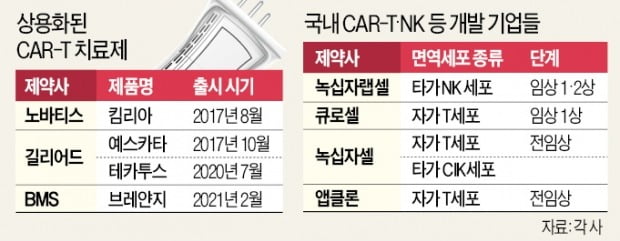Emily Whitehead, a 5-year-old girl from Philadelphia, USA, visited a local hospital in May 2010. When I traced the reason why the bruises on the whole body did not disappear, it was caused by’acute lymphocytic leukemia’, a type of blood cancer. After over a year of treatment, the situation did not improve. For Emily, who was judged by the time limit, her doctor suggested a clinical trial with the’last card’. In 2012, Novartis became the subject of the first clinical trial of’Kimria’, a chimeric antigen receptor T-cell (CAR-T) treatment that is being developed. The cancer cells in Emily’s blood disappeared completely after two months of medication. This is the background for CAR-T treatments to be called’miracle anticancer drugs’.
Nearly 10 years after Kimlia entered the first clinical trial, a’miracle anticancer drug’ that surpassed CAR-T is showing one after another. By using NK cells and macrophages instead of T cells, it has taken the challenge of overcoming the limitations of existing CAR-T and expanding treatment targets significantly.

○Development of general-purpose treatment instead of patient-specific
Green Cross Cell announced on the 22nd that it will develop a treatment for CAR-CIK (cytokine-induced killer cells) that utilizes general-purpose other umbilical cord blood cells instead of each patient cell. The manufacturing process of CAR-T treatment consists of ① extracting T cells from patient blood, ② genetically engineering T cells to find cancer target proteins, ③ mass culturing engineered T cells, ④ injecting engineered T cells into the body.
T cells are counted as the rifle unit of the immune system. Genetically engineered T cells leave normal cells as they are and only find cancer cells and attack them like a’guided bomb’. The effect is good, but the limitation is that you have to use cells extracted from the patient. That’s why the treatment cost alone amounts to 475,000 dollars (approximately 537 million won) in the United States.
CIK attacks cancer cells well, but the immune rejection reaction is not large even when other people’s cells are put into the body. By using this, CAR-CIK made in advance with other people’s cells can be stored frozen and administered to multiple patients at any time.
○ CAR-M clinical trial also started in the US
After Kimlia obtained approval from the U.S. Food and Drug Administration (FDA) in 2017, there are four commercially available CAR-T treatments. All are blood cancer treatments that treat leukemia and multiple myeloma. Although the treatment effect is good enough to reach 80%, it has not yet been developed as a treatment for solid cancer such as gastric cancer and liver cancer. This is why latecomers are focusing on developing solid cancer treatments.
Charisma Therapeutics, a biotechnology company founded by researchers at the University of Pennsylvania in the United States, gave a positive answer to this on the 18th. In order to develop CAR-M (macrophage macrophages) that utilize macrophages instead of T cells, we started a phase 1 clinical trial in humans. This is the first time a CAR-M treatment has been administered to humans.
Macrophages act as scavengers to remove dead cells from the body. Because these cells directly find and destroy the cancerous mass, it can also have an effect on solid cancer. Charisma Therapeutics has administered the first treatment to patients with recurrent and metastatic cancer in the United States. Many HER2 mutation-positive patients, such as breast cancer and lung cancer patients, are targeted.
Domestic pharmaceutical and bio companies are also developing solid cancer treatments. Green Cross Lab Cell is developing CAR-NK using NK cells. NK cells are also advantageous in developing general-purpose therapeutics using other people’s cells. Phase 1 and 2 clinical trials are in progress.
Green Cross Cell is further developing CAR-T candidates for the treatment of solid cancers such as pancreatic cancer. The goal is to apply for clinical trials with the FDA in the second quarter of next year. Qrocell is the fastest in the domestic clinical stage. In cooperation with Samsung Seoul Hospital, it is planning to administer the first drug to patients in phase 1 clinical trials next month. Abclone is also developing a CAR-T treatment.
Reporter Ji-Hyun Lee [email protected]
